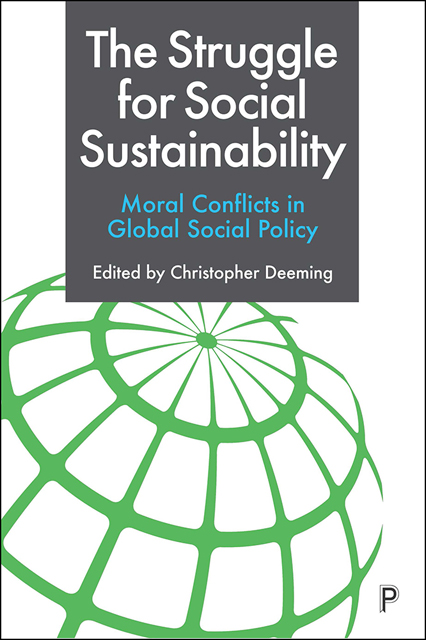Book contents
- Frontmatter
- Contents
- List of boxes, figures and tables
- List of abbreviations
- Notes on contributors
- Acknowledgements
- Preface
- 1 The ‘social’ in the age of sustainability
- 2 ‘No such thing as society’? Neoliberalism and the social
- 3 The social question: reconciling social and economic imperatives in policy
- 4 Disputing the economization and the de- politicization of ‘social’ investment in global social policy
- 5 The social dimension of sustainable development at the UN: from Brundtland to the SDGs
- 6 Paradigm lost? Blocking the path to ecosocial welfare and post- productivism
- 7 World population prospects at the UN: our numbers are not our problem?
- 8 Ageing sustainably
- 9 The political challenges to governing global migration and social welfare
- 10 Bringing in ‘the social’: an intersectional analysis of global crises and welfare
- 11 Global social policy and the quasi- concept of social cohesion
- 12 Putting the global in social justice?
- 13 ‘Go- social’? Inclusive growth and global social governance
- 14 For better or worse?
- 15 The struggle for social sustainability
- Index
14 - For better or worse?
Published online by Cambridge University Press: 14 April 2023
- Frontmatter
- Contents
- List of boxes, figures and tables
- List of abbreviations
- Notes on contributors
- Acknowledgements
- Preface
- 1 The ‘social’ in the age of sustainability
- 2 ‘No such thing as society’? Neoliberalism and the social
- 3 The social question: reconciling social and economic imperatives in policy
- 4 Disputing the economization and the de- politicization of ‘social’ investment in global social policy
- 5 The social dimension of sustainable development at the UN: from Brundtland to the SDGs
- 6 Paradigm lost? Blocking the path to ecosocial welfare and post- productivism
- 7 World population prospects at the UN: our numbers are not our problem?
- 8 Ageing sustainably
- 9 The political challenges to governing global migration and social welfare
- 10 Bringing in ‘the social’: an intersectional analysis of global crises and welfare
- 11 Global social policy and the quasi- concept of social cohesion
- 12 Putting the global in social justice?
- 13 ‘Go- social’? Inclusive growth and global social governance
- 14 For better or worse?
- 15 The struggle for social sustainability
- Index
Summary
Introduction
A crucial reason why governments everywhere drag their feet about the transition to environmental sustainability is that it is widely thought to depend primarily on a reduction in living standards. It looks not only as if reducing carbon emissions will mean tightening our belts and consuming less, but also having to make do with substitutes for what we prefer: having to give up eating meat, stop flying, use less plastic and replace private cars with public transport. In the public mind that inevitably makes facing the climate emergency a pretty dismal prospect, to be avoided for as long as possible.
To counter that perspective, some have argued that it is possible to transition to sustainability while at the same time producing higher standards of human wellbeing. This perspective is based primarily on three considerations. First, that in high-income countries, continued increases in material standards no longer lead to higher levels of happiness and life satisfaction. Second, that sustainable societies could satisfy fundamental human social needs very much better than high-income societies do now; for instance, by strengthening community life and reducing status competition. And third, that societies using renewable sources of power and electric public transport systems will be cleaner and quieter and will produce higher health standards. These views link the transition to sustainability to large-scale socioeconomic restructuring. Proposals span everything from replacing economic growth with maximizing human wellbeing as the central objective of government policy, to the much more radical demand for the abolition of capitalism itself.
The demand to replace gross domestic product (GDP) with wellbeing as the main objective of government policy has led to a growing academic industry devoted to developing wellbeing measures. Few of these, however, have been supported by research identifying determinants of wellbeing. Even when governments have adopted measures of wellbeing, as a few have, that does not mean that wellbeing will increase, nor does substituting wellbeing for the growth of GDP per head mean that the drivers of growth will lose their force. Not only is economic growth probably propelled by more fundamental forces than government policy, but it is likely that the same is true of wellbeing.
- Type
- Chapter
- Information
- The Struggle for Social SustainabilityMoral Conflicts in Global Social Policy, pp. 275 - 290Publisher: Bristol University PressPrint publication year: 2021



